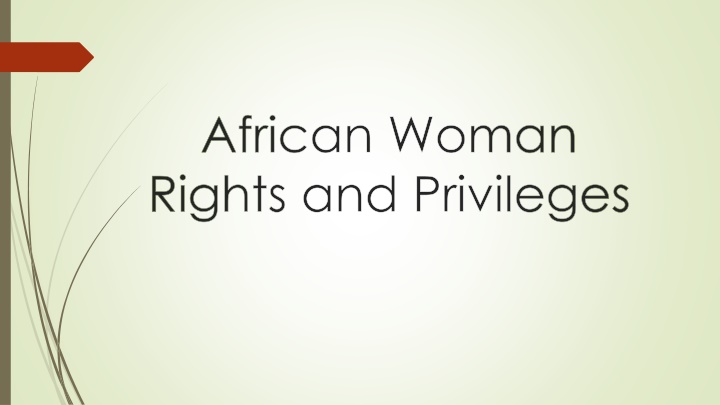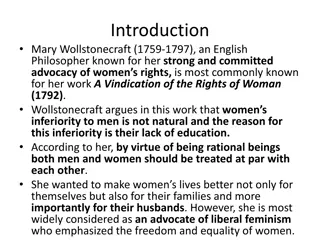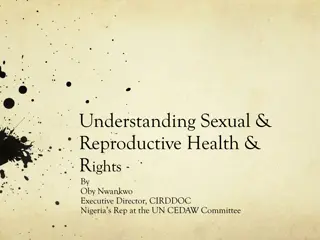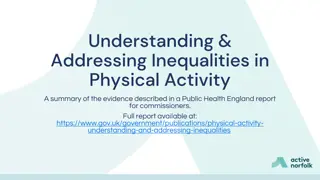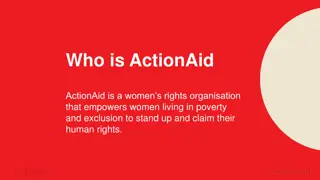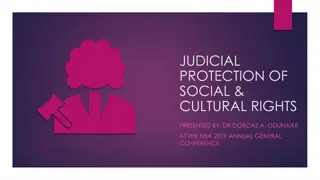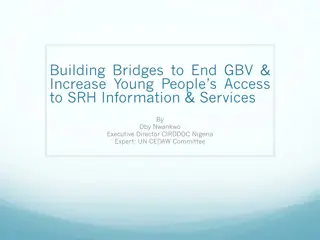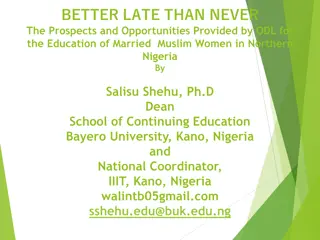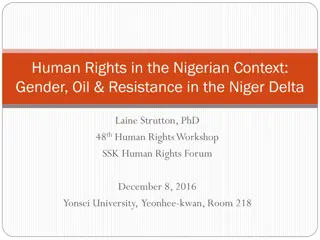Women's Rights in Nigeria: Challenges and Inequalities
Women's rights in Nigeria face significant challenges and inequalities, with societal norms often relegating women to second-class status. Despite available resources, women are denied certain privileges and opportunities, impacting their growth and equality. This article explores the violations of women's rights in Nigeria and the ongoing quest for gender equality.
Download Presentation

Please find below an Image/Link to download the presentation.
The content on the website is provided AS IS for your information and personal use only. It may not be sold, licensed, or shared on other websites without obtaining consent from the author.If you encounter any issues during the download, it is possible that the publisher has removed the file from their server.
You are allowed to download the files provided on this website for personal or commercial use, subject to the condition that they are used lawfully. All files are the property of their respective owners.
The content on the website is provided AS IS for your information and personal use only. It may not be sold, licensed, or shared on other websites without obtaining consent from the author.
E N D
Presentation Transcript
African Woman Rights and Privileges
Are Womens Rights and Privileges Violated in Nigeria and other African States? IIs Gender and Rights Equality Possible? Is Gender and Rights Equality Not Possible?
What are Human Rights? Rights according to United Nations Human Rights universal law that enjoyed and individuals. According declaration, every human ought to have equal access to exercise the fundamental human rights include, right to life, right to freedom of speech, etc. Declaration ought exercised is a to by be all this to rights. These
What are Human Rights? According Dictionary, human rights are rights (such as freedom from unlawful imprisonment, torture, and execution) belonging fundamentally to all persons. Human rights are the basic privileges and freedoms that are meant or ought to be enjoyed by all individuals of a given society. Simply put, human rights are the freedoms and benefits that accrue to all human beings, irrespective of individuals beliefs, nationality, family, religion, moral, social and political standpoints. to Merriam Webmaster regarded as
Does Nigeria respect women and human rights? Does Nigeria violate women and human rights?
In Nigeria, women are denied certain inalienable rights. Fact: Since time immemorial the rights and duties of women in Nigeria have been subjected aspiration of their men counterpart, and this has led to the denial of certain privileges and rights. to the wishes and
In Nigeria, women are denied certain inalienable rights. Fact: Nigeria societies reduces female gender as second class behind the males. Women in Nigeria are denied of certain comfort and enjoyment and growth despite all the available natural and human resources and as such women are defined by their ability to keep the home neat, nurture their children and work in pursuit of the success of their husband.
In Nigeria, women are denied certain inalienable rights. Fact: The social setting in Nigeria and other African states have been structured to inculcate the notions of inferiority in women and girls and superiority in men and boys right from childhood. Women are held down on the attainment of their goals and aspirations.
In Nigeria, women are denied certain inalienable rights. Fact: The patriarchal nature of most African states like Nigeria has denied some individuals like women and females in general the ability and access to exercise and enjoy the fundamental human rights. That is, women in African, Nigeria to be specific, are denied of certain inalienable right.
In Nigeria, women are denied certain inalienable rights. Fact: In political sector, there is less active participation of women. The rights and privileges of Nigerian women are denied in the political sector. This is evident in that there is a very low representation of women in the political sector and involvement in decision making of the nation. Only 9% of those who stood for election in Nigeria s April 2011 National assembly elections were women. Out of the 360 members of the House of the Representatives, only 25 are women, which is 6%.
Consequences Detriments to the growth of individual women in Nigeria societies. A vacuum of untapped resources and potentials. The potentials in women would be wasted as a result of the society s inability to see and utilise these hidden potentials because the society has been clouded with the mentality that women and girls are sex/gender with weaker vessel, inferior, objects of pleasure and thus has nothing to offer This inequality and subordination of the female gender has spurred into existence (radical) feminism. The future consequence of which might be continuous hatred and violence in the society.
Way Forward: Basic Tools to Ameliorate Rights and Privileges Inequality in Nigeria
Way Forward: Basic Tools to Ameliorate Rights and Privileges Inequality in Nigeria EDUCATION Through education men and women can be taught to understand and value the essence of human rights and privileges. Education will also make each individuals, both male and female, boys and girls, to understand their place in the society and disallow them to tamper with their counterparts right and privileges. If the right values and norms are inculcated in men and women, boys and girls, right from childhood, there will less cases of rights and privileges infringement and violation. Through education, occupants of the society will become aware of when and when not their rights are infringed upon. They will also become aware of acts, such as treason, murder etc., that are capable of give usurping their ability to exercise the fundamental human rights. Also, education will enlighten the populace on the necessary actions to take when their rights are been violated.
Way Forward: Basic Tools to Ameliorate Rights and Privileges Inequality in Nigeria MENTAL RE-ORIENTATION A genuine amelioration of rights inequality must start with a genuine mental re-orientation on the part of the individual person, man or woman, who must first apprehend a holistic perspective of the Female Principality as represented by woman, as an integral part of the consummate identity of the Absolute. If the mental conception is re-evaluated, such that men no longer conceive women as objects of pleasure and women also do not depict themselves as mere objects and tools, only then can there be a true motive for liberation in ensuring gender right equality.
Way Forward: Basic Tools to Ameliorate Rights and Privileges Inequality in Nigeria IMPLEMENTATION OF LAWS A strict implementation of laws of the land that are stipulated in the constitution must be enforced. Irrespective of one s tribe and race, one s right ought not to be violated. As stipulated in the constitution, no citizen of Nigeria shall be subjected to any disability or deprivation merely by reason of the circumstances of his birth. Nigerian constitution guarantees every one the right to dignity of the human person and , it forbids that any person be subjected to torture or to inhuman or degrading treatment, or held in slavery or servitude or required to perform forced labour.
Way Forward: Basic Tools to Ameliorate Rights and Privileges Inequality in Nigeria GENDER MAINSTREAMING Gender mainstreaming can be defined as a means of assessing the implication for women and men of any planned action, including legislation, policies or programmes in any area and at all levels. It entails making known and obvious to the populace their roles and duties in nation building in a bid to achieve gender and right equality.
CONCLUSION In spite of any difference that could exist in the nature of each individual in the society, the respect of individuals rights will directly help in the growth of the society as a whole. The reciprocity in the respect of individuals rights will promote harmony in the society and influence that idea that could be used to promote the decisions of ruling the country. Women constitute an integral part in nation building and as such their roles and rights must not be undermined or jettisoned. In other to have an effective system that encourages development, there is need for a hybridisation of men and women, boys and girls, potentials and resources.
Role of Education:Culture and ChangE Afolakemi O. Oredein Page 20 9/20/2024
Structure of Presentation 21 Conclusion Role of Education in Culture Change Culture & Education; Culture & Change Definition of Terms/Concepts Welcome & Introduction 9/20/2024
Baobab Tree 22 The baobab tree metaphor drives home the fact that knowledge needed for addressing the role of education in culture change goes beyond the capacity of a single effort 9/20/2024
A group of scientists placed 5 monkeys in a cage and in the middle, a ladder with bananas on the top. 23 9/20/2024
Every time a monkey went up the ladder, the scientists soaked the rest of the monkeys with cold water. 24 9/20/2024
After a while, every time a monkey went up the ladder, others beat up the one on the ladder. 25 9/20/2024
26 Scientists then decided to substitute one of the monkeys. The first thing, this new monkey did was to go up the ladder. Immediately, the other monkeys beat him up. After several beatings, the new member learned not to climb the ladder even though he never knew why. 9/20/2024
When 2nd monkey was substituted and the same thing occurred. The 1st monkey participated on the beating of the 2nd monkey. A 3rd monkey was changed and the same happened. The 4th was substituted and the beating was repeated and finally the 5th monkey was replaced. 27 9/20/2024
What was left was a group of 5 monkeys that even though none ever received a cold shower, continued to beat up any monkey who attempted to climb up the ladder. 28 9/20/2024
If it was possible to ask the monkeys why they would beat up all those who attempted to go up the ladder .. You will all agree with me that the answer would be . I don t know that s how things are done around here Does it sound familiar? 29 9/20/2024
Why do we continue doing what we are doing if there is a different and even a better way? 30 9/20/2024
Meaning of Education 31 It is a process of giving and receiving a systematic instruction A process of imparting or acquiring knowledge to bring positive changes in human life and behaviour A process by which people acquire knowledge, skills, habits, values or attitudes Three types: Formal (Schools/Institutions-structured and subject oriented) Informal (Practical adult learning, diversity in methods and content) Non-formal (very long process, learning from experience, home, workplace, environment) 9/20/2024
Meaning of Culture 32 It is the values beliefs and behaviour that form a group of people way of life Is the characteristics and knowledge of a particular set or group of people Elements of culture: religion, values, language, tradition and food among others Culture could be material or non-material Culture is passed from one generation to another Culture can be individual, communal, national or world Nigeria is so blessed that there about 250 ethnics and each ethnic has its culture 9/20/2024
Meaning of Change 33 Is the modification of a society through innovation It is simply an act or process through which something becomes different (Oredein, 2016) It is the changes that has occur over time to the shared way of life of a group It occurs when there is a contact with other culture It can be said that it has a broad spectrum of interpretation Change could be positive or negative There is virtually nothing that does not experience change 9/20/2024
Culture and Education 34 Culture and education cannot be divorced from each other. Culture and education are interdependent. The cultural patterns of a society guide its educational patterns in: Curriculum: The curriculum is prepared according to the culture of society. Methods of teaching: Culture and methods of teaching are intimately connected. The changing cultural patterns of a society exert its influence upon the methods of teaching. Discipline: Cultural values influence the concept of discipline. Text Books: Textbooks are foster and promote cultural values and ideals. Teacher: Is the integral member of the society. They infuse higher ideals and moral values in children. School: Is a miniature of a society. Is the centre of promoting, moulding, reforming, and developing the cultural pattern of the society. 9/20/2024
Culture and Change 35 Culture and change are tightly intertwined. It is the repositioning of culture, that is, the reconstruction of the cultural concept of a society. When change is initiated outside culture then there will be resistance. Factors of cultural change are: Contact: Contact between two society will obviously change the culture of both societies Technological Evolution: Any technological evolution will bring a change in culture. Geographical and Ecological Factor: This is a natural physical factor. Any change in physical features will automatically lead to a change in culture and the way of living 9/20/2024
Role of Education in Cultural Change Preservation of culture: Education is the only means through which this can be accomplished. Thus, education preserves the culture of a society. 36 Transmission of culture: The process of preservation includes the process of transmission from one generation to another. Development of culture: The function of education is to bring the needed and desirable change in the cultural ideals and values for the progress and continued development of the society without which social progress cannot take place. Continuity of culture: Culture is a life breadth of a society. Without which a society is bound to decay. Education upholds the continuity of culture through its diverse activities and programmes. Development of personality: Education aims at developing the personality of a child. It employs diverse cultural patterns of thinking, behaviour and cultural values so that children are physically, mentally, morally, socially and intellectually develop with the development of society to the maximum extent. Removal of cultural lag: Material culture develop at a faster speed due to scientific and technological inventions while non-material culture consisting of ideas, values and norms lags behind and create a gulf between the two. Education is the only means by which these gaps can be bridged. 9/20/2024
Page 37 Conclusion Conclusion related to Nigerian cultural heritage. A foreign system of education has been introduced without taking into account the cultural heritage. Modernization of education and cultural renaissance is needed to evolve education for its own culture. Education should transmit the culture to the new generation and transform the outlook of the young towards life in the light of the past; in the context of cross-cultural influences and in the light of the future requirements of the individual and the society. Education and culture are interdependent and complementary to each other. There is a need that education should be related to our own culture. Education system in some ways is not 9/20/2024
The Way Forward 38 i. Government, curriculum planners and other stakeholders should make education a true reflection of Nigerian culture ii. Teachers should be active and participate in the process of change and innovation especially in the area of curriculum change iii. Formal, Informal and Non-formal education should preserve and transmit culture to the next generation. 9/20/2024
References 39 Burnes, B. (2011) Introduction: Why Does Change Fail, and What Can We Do About It?, Journal of Change Management, 11:4, 445-450 Harris, A. (2003). Behind the classroom door: The challenge of organisational and pedagogical change. Journal of Educational Change, 4, pp. 369 - 382. Oredein, A.O. (2016). Good leadership for national development: The inevitable fraternal twins and irresistible skills as matters arising. 6th Inaugural Lecture, Lead City University, Ibadan, Oyo State Rogers, P., Meehan, P. and Tanner, S. (2006) Building a winning culture (Boston, MA: Bain & Company). Smollan, R & Sayers, J. (2009) Organizational Culture, Change and Emotions: A Qualitative Study, Journal of Change Management, 9:4, 435-457 Starr, K. (2011). Principals and the politics of resistance to change. Educational Management Administration & Leadership, 39: 646 9/20/2024
Page20 9/20/2024
HAZARDS OF TEENAGE PREGNANCY ANIFOWOSE, OLUWASEUN ADEOLA, PhD B.A (OGUN), M.A (IBADAN), PhD (IBADAN), MSC BIOETHICS (LEUVEN, NETHERLANDS, ITALY)
OUTLINE OUTLINE Introduction Who is a teenager? What is teenage pregnancy? What are the likely causes of teenage pregnancy? What are the hazard of teenage pregnancy? How can we prevent teenage pregnancy? Conclusion
INTRODUCTION INTRODUCTION Teenage pregnancy remains a front burner in the societal discourse, an issue begging for its rightful place in our national life at appropriate quarters and one with great concerns
WHO IS A TEENAGER? WHO IS A TEENAGER? A teenager is a person aged between 13 and 19 years The word teenager is another word for adolescent Adolescence is a transitional phase of development between childhood and adulthood They are called teenagers because their age number ends with teen An eighteen or nineteen year old person is called a young adult. This varies in societies
TEENAGERS TEENAGERS
CHANGES DURING THE TEENAGE PERIOD CHANGES DURING THE TEENAGE PERIOD There are many changes that comes in the period when the girl is no longer referred to as a child They have the brain of a young person but the body of an adult The teenage years are unique period of growth and development It is filled with energy, excitements and new experiences Teenage experiences their teen years uniquely
CHANGES DURING THE TEENAGE PERIOD CHANGES DURING THE TEENAGE PERIOD 1. They go through hormonal and physical changes 2. Rebellious: at this period, they start to resist authority and want to be independent from their parents. Sometimes, they engage in emotional verbal conflict with family 3. Energetic: some teenagers at this age become so energetic, some become adventurous , overlook the risk of sexual activity, drug experimentation. 4. Intellectual growth : ability to understand abstract things . Some even begin to question their parents
CHANGES DURING THE TEENAGE PERIOD CHANGES DURING THE TEENAGE PERIOD Being a period of transformation, it is characterized by a lot of instabilities and sometimes, outright confusion.
WHAT IS TEENAGE PREGNANCY? WHAT IS TEENAGE PREGNANCY? A teenage pregnancy is a pregnancy in female under the age of 20
